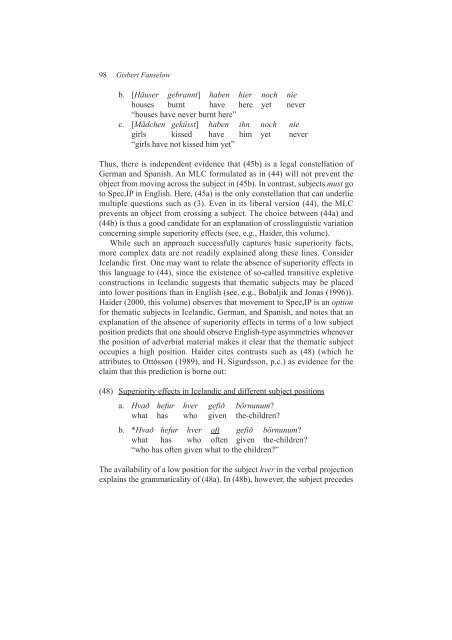Minimality Effects in Syntax · The MLC and Derivational Economy ...
Minimality Effects in Syntax · The MLC and Derivational Economy ...
Minimality Effects in Syntax · The MLC and Derivational Economy ...
You also want an ePaper? Increase the reach of your titles
YUMPU automatically turns print PDFs into web optimized ePapers that Google loves.
98 Gisbert Fanselow<br />
b.[Häuser gebrannt] haben hier noch nie<br />
houses burnt have here yet never<br />
“houses have never burnt here”<br />
c.[Mädchen geküsst] haben ihn noch nie<br />
girls kissed have him yet never<br />
“girls have not kissed him yet”<br />
Thus, there is <strong>in</strong>dependent evidence that (45b) is a legal constellation of<br />
German <strong>and</strong> Spanish. An <strong>MLC</strong> formulated as <strong>in</strong> (44) will not prevent the<br />
object from mov<strong>in</strong>g across the subject <strong>in</strong> (45b). In contrast, subjects must go<br />
to Spec,IP <strong>in</strong> English. Here, (45a) is the only constellation that can underlie<br />
multiple questions such as (3). Even <strong>in</strong> its liberal version (44), the <strong>MLC</strong><br />
prevents an object from cross<strong>in</strong>g a subject. <strong>The</strong> choice between (44a) <strong>and</strong><br />
(44b) is thus a good c<strong>and</strong>idate for an explanation of crossl<strong>in</strong>guistic variation<br />
concern<strong>in</strong>g simple superiority effects (see, e.g., Haider, this volume).<br />
While such an approach successfully captures basic superiority facts,<br />
more complex data are not readily expla<strong>in</strong>ed along these l<strong>in</strong>es. Consider<br />
Icel<strong>and</strong>ic first. One may want to relate the absence of superiority effects <strong>in</strong><br />
this language to (44), s<strong>in</strong>ce the existence of so-called transitive expletive<br />
constructions <strong>in</strong> Icel<strong>and</strong>ic suggests that thematic subjects may be placed<br />
<strong>in</strong>to lower positions than <strong>in</strong> English (see, e.g., Bobaljik <strong>and</strong> Jonas (1996)).<br />
Haider (2000, this volume) observes that movement to Spec,IP is an option<br />
for thematic subjects <strong>in</strong> Icel<strong>and</strong>ic, German, <strong>and</strong> Spanish, <strong>and</strong> notes that an<br />
explanation of the absence of superiority effects <strong>in</strong> terms of a low subject<br />
position predicts that one should observe English-type asymmetries whenever<br />
the position of adverbial material makes it clear that the thematic subject<br />
occupies a high position. Haider cites contrasts such as (48) (which he<br />
attributes to Ottósson (1989), <strong>and</strong> H. Sigurdsson, p.c.) as evidence for the<br />
claim that this prediction is borne out:<br />
(48) Superiority effects <strong>in</strong> Icel<strong>and</strong>ic <strong>and</strong> different subject positions<br />
a. Hva# hefur hver gefi# börnunum?<br />
what has who given the-children?<br />
b.*Hva# hefur hver oft gefi# börnunum?<br />
what has who often given the-children?<br />
“who has often given what to the children?”<br />
<strong>The</strong> availability of a low position for the subject hver <strong>in</strong> the verbal projection<br />
expla<strong>in</strong>s the grammaticality of (48a). In (48b), however, the subject precedes
















